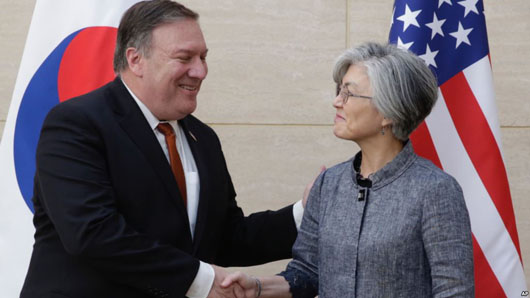by WorldTribune Staff, October 19, 2018
The new inter-Korean military pact could weaken South Korea’s defenses in the event of an attack from the North, U.S. military analysts say.
Friction between Seoul and the White House has generated growing alarm among strategists in the pro-U.S. alliance seeking to counter the China-North Korea axis in Northeast Asia.

Bruce Bennett, a senior defense analyst at the RAND Corp., said creating a 10-kilometer-wide ground buffer zone and removing guard posts in the DMZ will open a route for the North to undermine Seoul’s defenses, as well as its domestic activities, Voice of America reported on Oct. 19.
“If the Demilitarized Zone becomes an open port of access into South Korea, they could be funneling all kinds of agents into the South who would do anything from collection of information to sabotage activities,” Bennett said.
South Korean Foreign Minister Kang Kyung-Wha acknowledged that U.S. Secretary of State Mike Pompeo expressed discontent when she spoke to him after Seoul outlined plans to sign the pact with the Kim Jong-Un regime during the third inter-Korean summit in September.
Related: President Trump’s sharp rebuke reveals frustration with Seoul’s leader, Oct. 15, 2018
“The North has always made the invasion of the South a priority and also subversion of the South a priority. And so a failure to control the border area makes major risks in terms of kinds of actions that the North Koreans could do,” Bennett added.
Military analysts say that South Korea made several concessions in the deal while the North gave up next to nothing.
“(South Korean) President Moon (Jae-in) is rushing into a lot of moves before the North Koreans actually make their own reciprocal moves. And I think that that’s dangerous,” said Bruce Bechtol, a retired Marine and former intelligence officer at the Defense Intelligence Agency who researches North Korea’s military at Angelo State University in Texas.
Under the inter-Korean military pact, a no-fly zone will be set up as well as maritime and ground buffer zones around the Demilitarized Zone (DMZ). The two Koreas also agreed to stop military drills targeting each other near the military demarcation line that runs within the DMZ, the VOA report said.
Frank Aum, who served as the senior adviser of North Korea in the Office of the Secretary of Defense and is currently a senior expert on North Korea at the U.S. Institute of Peace, said a no-fly zone will blindfold the U.S. and South Korean forces that monitor North Korean activities in the DMZ.
“The scope of the no-fly zone could weaken the alliance’s ability to conduct intelligence, surveillance and reconnaissance operations, as well as access U.S. bases within the zones,” Aum said.
Additionally, in an effort to create “a peace zone” along the heavily fortified border near the DMZ, Seoul and Pyongyang agreed to clear landmines near the area. The process began Oct. 1.
Demining the DMZ gives North Korea a strategic advantage for mounting an offensive, according to David Maxwell, a former Special Forces colonel who is now a senior fellow at the Foundation for Defense of Democracies.
“The removal of mines in the three major attack corridors, Kaesong-Munsan, Chorwon and the East Coast, provides an advantage to the North, should it choose to attack,” he said.
Bechtol said South Korea will become vulnerable to a potential North Korean attack when landmines and guard posts are removed in the DMZ area, which were set up to stall North Korean forces from advancing to the South.
“These are all things that can give the South Korean army early warning and stop an attack if it actually occurs,” Bechtol said.
Pompeo, in an interview with VOA contributor Greta Van Susteren, said a second meeting between President Donald Trump and Kim Jong-Un is being planned.
“I’m not prepared to tell you when it’s going to be, as the date has not yet been set, but the president’s committed to doing that,” Pompeo said. “We’re working on finding dates and times and places that will work for each of the two leaders. I’m very hopeful we’ll have senior leader meetings here in the next week and a half or so between myself and my counterpart to continue this discussion.”
Pompeo said Kim told him, during their meeting two weeks ago, that “he stands by the commitment he made to President Trump in Singapore on June 12th” for denuclearization.
Subscribe to Geostrategy-Direct __________ Support Free Press Foundation
